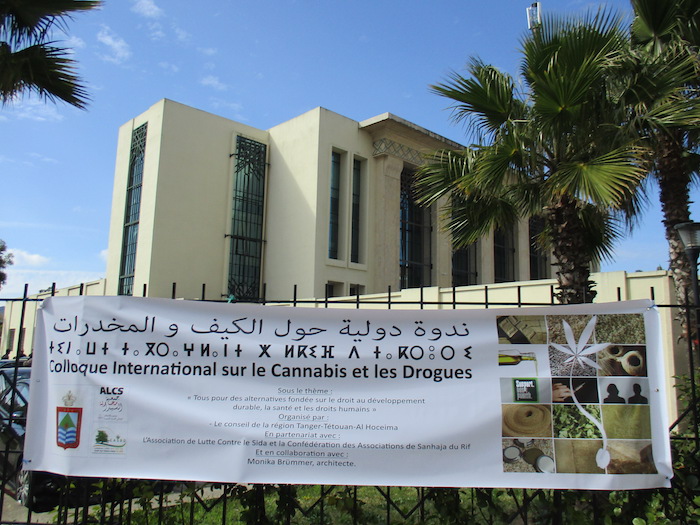HT reports from the International Colloquium on Cannabis, organized by the Council of the Region of Tangier-Tetouan-Al Hoceima, Morocco, in partnership with the Moroccan Association for the Fight Against Aids (ALCS), and the Confederation of Associations of Senhaja of the Rif for Development (CASRD) in collaboration with hemp building architect Monika Brümmer.
TANGIER – Morocco’s government needs to embrace the peoples of the country’s High Central Rif — long a source for highly-potent marijuana — by first decriminalizing cannabis, and then re-orienting its production toward medicinal, health, hemp construction and other development purposes, key leaders of the region said at a conference here last week.
“We’ve been punishing the villagers for decades while they plant a crop that has actually been proven beneficial to humans,” Ilyas El Omari, President of the Tangier-Tetouan Region, which includes the Rif, told the gathering in a sometimes fiery speech that kicked off the conference.
The event was a call for a sea change in policy toward the Rif’s cannabis-based economy that’s long been dependent on the region’s strong marijuana strains that are processed into kif, a form of marijuana usually pressed into hashish. While illegal in Morocco, kif production has meant survival to nearly 80,000 Riffian families down through the years, El Omari said.
Misplaced punishment
“And while we’ve been punishing these growers, we’ve prosecuted fewer than 1% of the actual drug traders — and there are at least 40,000 of them,” he said of the criminal elements who pay the farmers little for their crop and reap huge profits around the world.
The President stressed that it’s not only farmers who’ve lived off cannabis grown high in the mountainous Rif, the most densely populated region of Morocco.
“When you look closely at it, you see a broad range of players (in the region’s illicit cannabis business),” the President said. “It’s a whole production and distribution chain,” he added, noting other Riffians make modest means transporting and exporting the substance.
Distrust of the government
According to President El Omari, distrust of Morocco’s central government is so great that when politicians go to the Rif to encourage voting in Moroccan elections, the locals stay away. “They think it’s a trap to draw them in and arrest them,” the President said.
“The reality on the ground is that all these parties have suffered for decades under selective policies of criminalization. They feel marginalized, if not downright persecuted,” El Omari said.
Population of the Rif area is more than 450,000, while the average age of the inhabitants is 15 and a typical family has eight children. The area is made up mostly of tribes and clans who for centuries have lived in the Rif and who suffer poor local infrastructure, unsafe sanitary conditions and a lack of educational opportunities — factors some feel could lead to rebellion.
Potential in hemp-building
“We have no roads, clinics, hospitals or schools,” said Adellatif Adebibe, president of the Targuist-based Confederation of Associations of Senhaja of the Rif for Development (CASRD). “They left us to our own devices. The historic ban on cannabis — promoted by the UN — had no regard for local people. They wanted to take it (cannabis) away, but there was little done to replace that economy except for half-baked proposals,” he said. “Our people suffer. They’ve had no voice in this.”
Aside from supporting the idea of steering cannabis production toward health and medical products under a legalization movement, Adebibe is promoting a project to use hemp-based building material derived from the leftover stalk of the area’s abundant marijuana fields to restore traditional farm homes in the Rif, and for new public buildings.
That gives the effort in the Rif a cultural preservation mission along with economic development, said Monika Brümmer, an architect and inventor who specializes in hemp building and historic restoration, and who is leading the rebuilding project in cooperation with Adebibe.
“The idea is to protect the architecture along with the culture,” Brümmer said. “The materials are in abundance, and we’ve tested them to know they will give us highly efficient means to save these buildings, and to create new schools, clinics and other public spaces,” she added.
That would lead to jobs in the processing of cannabis straw and in hemp-based construction as well, Adebibe and Brümmer said, and the materials could be exported to underpin economic development.
Rising voices over drug policy
Other speakers at the conference supported President El Omari’s vision for the Rif with presentations reflecting legislative and human rights developments in the context of global and national drug policies. Their input was part of a declaration drafted at the close of the conference that will be presented at the United Nations’ 2016 Special Session on the World Drug Problem (UNGASS) set for April 19-21.
Meanwhile, a Global Forum of Producers of Prohibited Plants held in January is essentially pushing the same agenda in support of small farmers in various parts of the world — including Morocco. It put forth a declaration Jan. 21 calling for discontinuation of bans on a wide range of plants that go back to the 1961 UN Single Convention, and another Convention from 1988.
That Forum represented Albania, Bolivia, Colombia, Spain, Guatemala, Indonesia, Jamaica, Morocco, Mexico, Myanmar, Paraguay, Peru, St. Vincent and the Grenadines, and South Africa.
Also, three former Latin American presidents urged the UN to admit to the “unmitigated disaster” of the “war on drugs” in a March 11 editorial in the Los Angeles Times.
The trio criticized preparations leading up to next month’s UNGASS meeting, charging organizers excluded input from key agencies working on health, gender, human rights and development.

